LATEST NEWS


Fresh produce is not a phrase you hear often in East L.A. Just visit any corner store and you can see why.
East L.A. is one of many “food desert” communities in the L.A. Basin. – communities where healthy, affordable food is difficult to obtain. Walk down any street and you will find a fast-food joint way sooner than you’ll locate a healthy food market. Our residents and kids are bombarded with chips, candy, ice cream and advertising for alcohol when they do go shopping. It’s no wonder that a child will sooner pick up a bag of “takis” (a popular chip brand) than go on looking in vain for healthy food.
In East L.A., the common venue for food purchasing is the corner store. These stores are typically small businesses that sell alcohol, tobacco, snack foods, sodas, candy and very little fresh, high-quality food products. Unfortunately, the fruits and vegetables they sell are frequently bruised,


(This reposted Harold Meyerson blog originally appeared in slightly different form on American Prospect. )
In 1938, Congress passed, and FDR signed into law, the Fair Labor Standards Act, which established the first federal minimum wage and overtime protections. And that, to the extent that most Americans think about the minimum wage, was that. To be sure, Congress occasionally raises the minimum wage (though they’ve got a long way to go to make it a living wage), but the national law, covering all workers, has long since been established, right?
Not quite.
In fact, the 1938 law only passed when Roosevelt and congressional liberals agreed to exclude some categories of workers—categories that included many millions of people—from its coverage in order to win the votes of the Southern Democrats they needed to pass it. So agricultural workers (by which Southern Democrats meant,
» Read more about: Behind the Home Care Workers’ Wage Victory »


(This reposted feature by David Wallis originally appeared on the American Prospect.)
At a time when legislators, consumer advocates and the Occupy movement batter big banks for their questionable business practices, J.P. Morgan Chase and Bank of America have gone soft and fuzzy. The nation’s two largest banks are running saccharine television commercials that portray the massive multinationals as the Bailey Building and Loan Association.
Bank of America recently rolled out its “Opportunity” campaign to highlight the company’s nationwide bid to lend a hand—i.e., money— to small businesses. (Ironically, It’s A Wonderful Life director Frank Capra modeled the Bailey’s bank on BoA.)
In Brooklyn, tenants of a green affordable housing project partly funded by BoA gush over their sleek new apartments, replete with AC and electric keys. “No one can pick the lock,” notes a tenant in a web version of the ad.
» Read more about: Two Soft-Hearted Banks: It’s a Wonderful Lie »


Southern California’s Economy was spared a beating when 62,000 grocery employees belonging to the United Food and Commercial Workers union won a fair three-year contract from three major supermarket chains without having to go on strike.
Nothing said Politics more than the Occupy movement– which quickly set up camp in Los Angeles around City Hall. Photojournalist Tony Zinnanti captured the hope and youth of this campaign with a timeless image of a mother and child.
 Another year, another oil spill assaulting the Environment. This time it was Exxon Mobil’s turn to dump a little crude — into the Yellowstone River.
Another year, another oil spill assaulting the Environment. This time it was Exxon Mobil’s turn to dump a little crude — into the Yellowstone River.
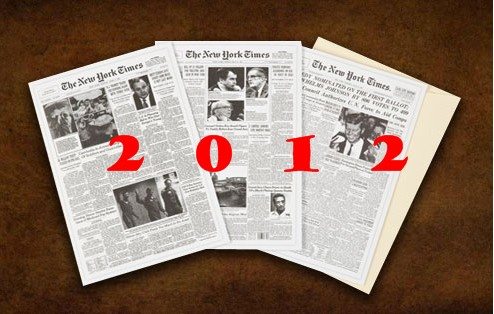

This 2012 newspaper headline wishlist first appeared on the Labor Lou blog.
1) Gingrich Sews Up Nomination
Former House speaker clears the field as Romney pulls out
2) Scott Walker Recalled
Wisconsin voters remove unpopular Republican governor
3) Clinton, Biden Swap Jobs
Convention taps Hillary for VP; Biden will head State Department
4) OWS Veterans Get Political
Wall Street protesters energize Obama campaign
5) Clarence Thomas Resigns
Conflict of interest sinks Supreme Court justice
6) Unemployment Down, Consumer Confidence Up
Optimism rising as election nears
7) Democrats Take Back House
Pelosi promises progressive agenda
8) Demands Grow to Curtail Filibuster
Senate Republicans might lose their best weapon
9) Obama Makes Labor Reform “Top Priority”
Declares unions “Key to economic justice”
10) Court’s Conservative Majority Jeopardized by President’s Pick
Justices could revisit “Citizens United”


Should we chuckle or cry whenever the American conversation slides back into rumor and paranoid nightmare? Below are five of this year’s more unforgettable fantasies, debunked by America’s leading myth-busters, Snopes.com.
1. Michelle Obama is pregnant — and White House spokesman Robert Gibbs was fired for discussing this!
2. Liberal billionaire George Soros is buying up U.S. gun makers – in order to shut them down.
3. Department of Energy $737 million loan to a solar-energy project will only create 45 jobs – and the company’s run by a Pelosi!
4. Barack Obama uses a Social Security number belonging to a deceased Hawaiian born in 1890.
5. NBC edited out a reference to Christ in an interview with family members of deceased Navy SEAL.


What a drag—I have recently been worried about the memory loss I have sort of grown used to over the last few years. I’m not afraid of Alzheimer’s—and I don’t feel unique. Fortunately I get a lot of support from my “fragmented” younger and older friends who assure me that I’m not the only one who is experiencing the well-known list of “senior moments,” including:
“What did I walk into this room to get?”
“ Where are my glasses and keys?”
“I drove right past the post office I always go to!”
“I can’t remember names.”
You probably have your own list.
But when you are almost 85 years old—and have finally chosen to admit it to yourself — it takes on another dimension. How am I supposed to proceed to make life creative and fulfilling in the ways I know best, before I fully accept this new stage?


Here is a shorter — and more modern — rendering of the Christmas poem by Clement Clarke Moore (1823).
‘Twas the night before Christmas, when all through L.A.
not a good job was to be found, not even for low pay.
The job apps were filled out, the interviews complete,
in hopes that all would keep shoes on their feet.
The children were nestled all snug in their beds,
while visions of Xboxes danced in their heads.
But we were barely paying the mortgage, and clean out of cash
so sadly, this Christmas, there would be no big bash.
When into my mind came a brilliant idea.
What if there were a million good union jobs here?
It’s not so outlandish, it’s not so remote —
I jumped out of bed and put on my coat.
The moon shown down on the city’s bright lights
as I drove my old car west toward Angelino Heights.


As a resident of Lincoln Heights, I’ve always been able to use public transportation to get around. I live in what you could call a “low-income transit village.” Most of the major bus lines that connect our region are within walking distance of my home. Bus lines like the 45 and 81 provide me access to South L.A. to visit friends, while the 84 and 251 connect me to my family in East and Southeast L.A. This is on top of the Gold line and all the destinations it opens up for me.
Unfortunately, easy access to public transportation is not available to many Angelenos. This is far more than an inconvenience, because often the communities that lack bus and rail options also suffer from high poverty and unemployment rates. For those fortunate enough to have a job, driving in many cases is not an affordable means to get around,
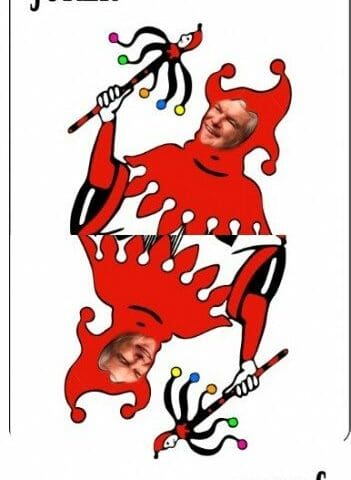
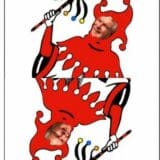
(This column first appeared in slightly longer form on Huffington Post.)
As a House back-bencher and then as Speaker, Newt Gingrich made his name as a fiery opponent of wasteful government spending. But, in fact, he was one of Congress’s biggest spenders.
Gingrich’s big-spending habit is perhaps the most important, but the least-known, of his many hypocrisies. When will a reporter — or one of Gingrich’s GOP opponents — ask him about this in one of the debates?
The twice-divorced Gingrich’s hypocrisy on “family values” is now well-known, yet there’s another example of Gingrich’s ethical double standard. Gingrich — who quarterbacked a successful effort to force House Speaker Jim Wright, a Texas Democrat, to resign over ethics violations in 1989 — was himself embroiled in an ethics scandal during much of his own speakership. Gingrich used GOPAC — his conservative fundraising operation —


I could be a hopeless optimist, but it seems that more people are thinking deeply about the kinds of lives they want to lead as life has become harder in our country. Recently I was invited to speak to students in a Nonprofit Leadership graduate program on “How to Build a Career Based on Social Justice Principles.” It gave me a chance to think about what has worked for me, and these are the guidelines I shared that evening:
1. Do the work you think needs to be done — whether you get paid for it or not. Our life “careers” are made up of the work we do for pay as well as what we choose to do in our personal time. Instead of dreaming of getting paid to do the work you truly believe in, go ahead and do it now as a volunteer. All the important justice movements of our times – civil rights,
» Read more about: Your Choice: The Just Life – Or Just Life »
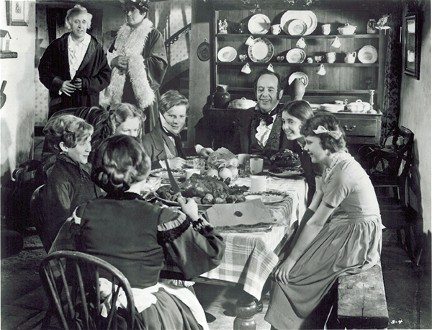

Once again the holidays are upon us and, like everyone else, I’m running around, from one party to the next. It’s a chance to catch up with folks I haven’t seen in ages or have been meaning to see for ages. It’s also a time of numerous fundraisers. Which means I don’t have to shop.
Really? Aren’t we all supposed to be consuming to keep the economy humming? Or at least idling? So they say. I was supposed to go out and shop after 9-11 too. I didn’t take the capitalists’ advice then and I’m not taking it now. Not totally, that is. Because I do spend a ton of money during the holidays. But I spend most of my hard-earned cash on drinks and food, which I would argue feeds the local economy, and that’s more important to me in our current tough times.
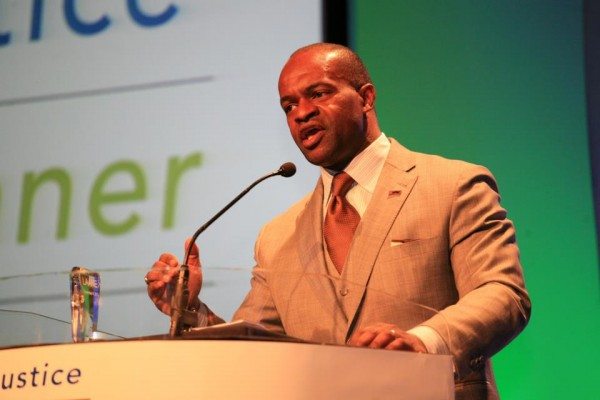

Part Two of a two-part interview
I spoke with DeMaurice Smith, executive director of the NFL Players Association, before he and the association were given LAANE’s City of Justice Award at the Beverly Hilton Hotel on December 8. The first half of the interview ran yesterday in the Frying Pan.
Caroline O’Connor: Do you feel that the NFL owners had an agenda to bust the players’ union?
DeMaurice Smith: I made it perfectly clear to our players that the existence of our union was what was at stake. I believed that the day I took the job. It was important for our players to understand that this was not just a contract negotiation.
CO: It appears that there was a lot of real solidarity among the star players and all of the players. How was that achieved?


Black Friday may be a distant memory already, but as we head deeper into the holiday shopping season, there are some important lessons to be learned about the psychology of marketing and the real cost of bargain hunting.
Here’s a cautionary tale from my own life: One year on the day after Thanksgiving, my uncle, a tech geek, woke my brother and me up at an ungodly hour to get to Fry’s Electronics by 5 a.m. The doors opened at 7 a.m. Despite us ending dinner early, waking up before the crack of dawn and standing around in the dark for hours, most of the deals had already been whisked off the shelves by the time we got in the door. We wandered around a store so crowded it bordered on unsafe before finally buying some gadgets just to feel like we hadn’t wasted our time.
This year, as the recession continues,
» Read more about: Black Friday and the Psychology of Scarcity »


Part One of a two-part interview
I stole DeMaurice Smith. That is, I grabbed 20 minutes with the executive director of the NFL Players Association, between poses in front of the step-and-repeat and shaking hands with enthusiastic dinner guests. Smith and the association were honorees at the December 8, LAANE City of Justice Awards Dinner, along with Culture Clash and the main guest of honor, Madeline Janis, at the Beverly Hilton. Later, Smith gave a rousing speech to a packed ballroom without looking at a single note. Just sayin’.
I wanted to know more about the guy I saw on TV during the first half of 2011 who brought all of the football players into a huddle — not to call out plays on the field, but to talk organizing strategy and give pep talks on contract negotiations.
» Read more about: NFL’s DeMaurice Smith on Everyday Work and Ordinary People »
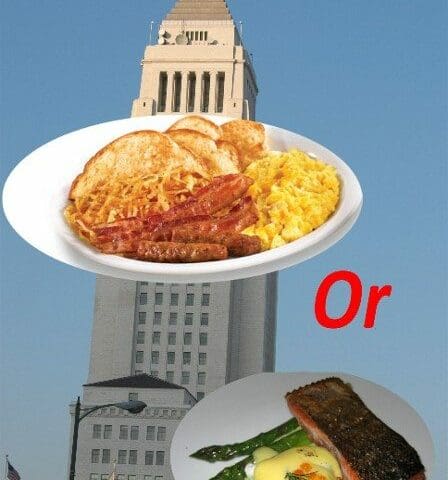

It’s just not fair. For years, business and civic leaders have been telling public officials like me to “run government like a business.” Recruit top-flight executives who know how to get things done. Spend what’s necessary at the “top” so that the over-arching goals of the enterprise can be achieved. Get rid of all of that unnecessary bureaucratic “process” that just slows things down. Make the “deals” happen and get on with the business of government.
Unfortunately, when we do just that, we get slammed. In fact, an outside observer might point out that all of this emphasis on running government like a business is just a trap for the poor unsuspecting schlubs (a.k.a., government officials) who are just trying to do what they’re told.
Case in point is the situation at the Housing Authority of the City of L.A., responsible for all public housing in L.A.


Here’s an issue custom made for the Occupy movement: the billions of dollars spent every year by local and state government on tax breaks and subsidies meant to attract businesses. Occupiers outraged about bank bailouts should check out the new study, Money for Something, by Good Jobs First, which finds that government largesse often comes with no strings attached in terms of job creation or job quality.
The report seems to have struck a chord with a newly responsive press, which has been given license by the Occupy movement to, however belatedly, shine a spotlight on the myriad ways in which corporate America has rigged our political system to their advantage. Check out the excellent New York Times piece on this important expose.
» Read more about: WebHot: Here’s the Money, Now Show Us the Jobs »

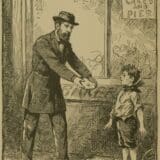
T’is the season of the full mailbox. Every day when I pick up our mail, the box is stuffed with requests for donations. My wife Susan and I get them from everyone – from CARE to the Salvation Army to cancer research to the Red Cross. We get them just like you do because this is the time of year when people think about giving to others – and tax deductions only count if you make that donation before December 31.
Poring over some demographic materials a few years back, I realized that Susan and I are among the top three percent of givers in Southern California. I couldn’t believe my eyes. How could a low-paid Methodist minister give away enough money each year to be in the upper echelon of generosity? Especially with all the wealth in Los Angeles.
Turns out, it wasn’t hard at all. We practice the ancient religious tradition of tithing – we give away 10% of our income.


People often get pretty touchy this time of year. Maybe it’s having to go to the mall. Maybe it’s the stress of dealing with family. Maybe it’s thinking about all those broken resolutions from a year ago. But whatever the reason, Americans tend to lash out at each other more than usual.
A perennial complaint has to do with the so-called “War on Christmas.” Showing that my own people don’t have a monopoly on a persecution complex, some Christian groups are very quick to declare themselves under attack. And to be sure, our on-again-off-again national flirtation with inclusivity does lead many people to say things like “Happy Holidays.” (I know, how hateful!)
Many of these groups and individuals base their indignation on the “fact” that this is a Christian nation. Of course, we are not a Christian nation, though the Judeo-Christian tradition informed many of our earliest values and laws.
» Read more about: Singing the First Amendment Christmastime Blues »


(Editor’s Note: In the holiday spirit we present this enlightening poem — with a tip of the hat to Dr. Seuss. Please click on the link for the stanza layout.)
All the Las
Down in La-ville
Liked Christmas a lot…
But the Snitch,
Who lived just North of La-ville,
Did NOT!
The Snitch hated Christmas! The whole Christmas season!
Now please don’t ask why, ‘cause we all know the reason.
What made that old Snitch-man so mean and so sour
Was the way all the Las used up holiday power.
They used it on parties. They used it on shows.
They used it to light up a young reindeer’s nose.
But what made the old Snitch really put up a fight
Was the excess they used on their holiday light.
How he hated the blinking!
» Read more about: A Christmas Snitch Sees the Light (LEDs, That Is) »